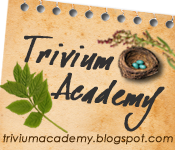Here's a glimpse of what others have said about poetry and children.
Kym Wright, printed in Practical Homeschooling #18, 1997
Poetry
Loving the wonderful poems of Robert Frost and others, I make a beeline for any portions of curriculum that deal with rhyme. We include reading and writing verse, to satisfy my desire to instill in them a fondness for poetry, while teaching them how to write it themselves. Encouraging my children to "just write a poem" doesn't work, so we use a program for writing poetry to continue for several weeks or more. Sometimes, it helps to use a topical resource from the library. Reading poetry with everyone encourages "familiness" that we so enjoy, but they write on their own level. Beginning with the basics, we practice specific points each week: identifying rhyming words (those with the same vowel and ending sounds); saying words that rhyme with a word I give; writing couplets (two sentences or lines that rhyme at the end); composing a simple rhyming poem; haiku, cinquain, multiple verses; and so on.
Loving the wonderful poems of Robert Frost and others, I make a beeline for any portions of curriculum that deal with rhyme. We include reading and writing verse, to satisfy my desire to instill in them a fondness for poetry, while teaching them how to write it themselves. Encouraging my children to "just write a poem" doesn't work, so we use a program for writing poetry to continue for several weeks or more. Sometimes, it helps to use a topical resource from the library. Reading poetry with everyone encourages "familiness" that we so enjoy, but they write on their own level. Beginning with the basics, we practice specific points each week: identifying rhyming words (those with the same vowel and ending sounds); saying words that rhyme with a word I give; writing couplets (two sentences or lines that rhyme at the end); composing a simple rhyming poem; haiku, cinquain, multiple verses; and so on.
Sylvia M. Vardell, Ph.D. and Mem Fox
Poetry helps children move forward in their literacy development by introducing new vocabulary and figurative language, reinforcing phonemic awareness through sounds and rhymes. It is rich in imagery and sensory language and stimulating to the imagination. It is meant to be spoken and heard, and thus provides practice for oral language development, listening, and oral fluency. Author and literacy expert Mem Fox states, "Rhymers will be readers; it's that simple. Experts in literacy and child development have discovered that if children know eight nursery rhymes by heart by the time they're four years old, they're usually among the best readers by the time they're eight." (From Reading Magic: What Reading Aloud to Our Children Will Change Their Lives Forever, Harcourt, 2001)
David Campbell, author quotes Mem Fox
Poetry's important role is emphasised by Mem Fox on her website: "Children adore rhyme, rhythm and repetition . . . Young children are mesmerised and enchanted by a predictable pattern of language which is fun for them to say and pleasing for them to hear."
Poetry is thus a wonderful tool in the development of language, reading and writing. Rhymes and chants help children to see the relationship between oral and written language and assist in developing listening and concentration skills.
Most importantly, poetry is meant to be read aloud. Mem Fox tells us to: "Read aloud with animation. Listen to your own voice and don't be dull, or flat, or boring. Hang loose and be loud, have fun and laugh a lot."
Charlotte Mason from PART V - Lessons As Instruments Of Education in The Original Homeschooling Series
Reciting and memorizing are two different things. It is good to store a lot of poetry in a child's memory, and it doesn't have to take any work to learn it. A few years ago I visited a lady who was raising her niece using her own educational approach. She handed me an oversized sheet of writing paper with the names of poems. Some were long, difficult poems, such as Tintern Abbey. She said that her niece could repeat any of them that I wanted, yet she had never consciously attempted to learn a single verse by heart. The girl did repeat several of the poems on the list, quite beautifully and without stumbling.
Then the lady told me her secret. She thought she had stumbled on an amazing discovery, and I agreed. Here's what she would do. She would read a poem all the way through to the girl. The next day, while the girl was sewing a doll's dress or something, she would read it again. She might read it the next day while brushing the girl's hair. She would get in maybe six days of this, depending on the length of the poem, reading the poem at various times, once during each day. And after a few days, the girl could say the poem that she 'had not learned.'
Then the lady told me her secret. She thought she had stumbled on an amazing discovery, and I agreed. Here's what she would do. She would read a poem all the way through to the girl. The next day, while the girl was sewing a doll's dress or something, she would read it again. She might read it the next day while brushing the girl's hair. She would get in maybe six days of this, depending on the length of the poem, reading the poem at various times, once during each day. And after a few days, the girl could say the poem that she 'had not learned.'
Ruth Beechick, Language and Thinking for Young Children (K-3)
pg. 45, Enjoying Poetry
"Poetry expands the child's knowledge of English sounds, words, rhythms, phonics, sentence forms, and other aspects of language itself. And poetry expands the child's way of looking at the world and his life.
How can you know when you have taught your child to enjoy and appreciate poetry? When you see the child do one or more of the following:
1. Ask for you to read or say a poem.
2. Say parts of a poem for the fun of it.
3. Use prayer poems.
4. Laugh at funny poems.
5. Recite one or more poems from memory.
6. Express his thoughts in rhythm and rhyme."
How can you know when you have taught your child to enjoy and appreciate poetry? When you see the child do one or more of the following:
1. Ask for you to read or say a poem.
2. Say parts of a poem for the fun of it.
3. Use prayer poems.
4. Laugh at funny poems.
5. Recite one or more poems from memory.
6. Express his thoughts in rhythm and rhyme."
Laura Berquist, The Harp and Laurel Wreath: Poetry and Dictation for the Classical Curriculum
From the Introduction
Little children are good at memorization: they pick up jumping-rope rhymes and dogerel verses without effort. Encourage this inclination and ability by having the children memorize fine poetry, among other things. This will strengthen the imagination and memory, as well as prepare the children for subsequent stages of intellectual development. Since poetry draws attention to specific aspects of experience, regular exposure to poetry will reinforce children's observational powers.
Little children are good at memorization: they pick up jumping-rope rhymes and dogerel verses without effort. Encourage this inclination and ability by having the children memorize fine poetry, among other things. This will strengthen the imagination and memory, as well as prepare the children for subsequent stages of intellectual development. Since poetry draws attention to specific aspects of experience, regular exposure to poetry will reinforce children's observational powers.
Read this article: Using Poetry to Teach about Minerals in Earth Science Class
Poems in Math Class? Yeah, Write! by Greg Tang
Poetry Memorization: Methods and Resources by Susan Wise Bauer
A Children's What? by the editors of The Poetry Foundation
As you can probably tell, I'm researching poetry and it's use in a child's education. I will be sharing some wonderful resources I've found and the books that are the most highly recommended.





























No comments:
Post a Comment